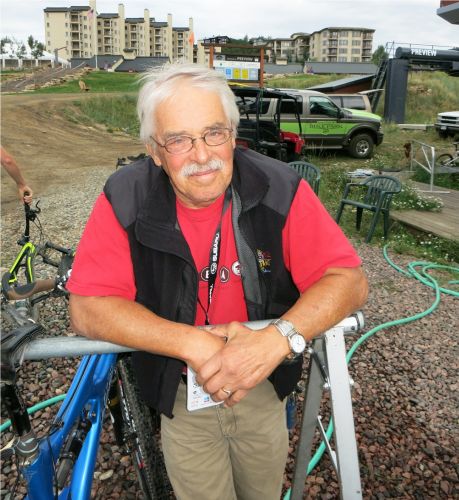STEAMBOAT SPRINGS, Colo. (BRAIN) — Michael Kelley, one of the original founders of the International Mountain Bicycling Association (IMBA) and now age 71, said the electric mountain bike he has been riding has renewed his interest in mountain biking.
Kelley was asked to offer his thoughts on e-mountain bikes prior to a panel discussion at the biennial IMBA World Summit on how IMBA and the bicycle industry should best handle what is essentially a new category of bikes.
“I’ve been riding for decades, and I want to ride for decades more,” said Kelley, sparking a round of laughter in a packed ballroom in The Grand, IMBA’s event hotel at this mountain resort.
“But now I find myself—dreadfully—off the back, and mountain biking is not as much fun when you’re riding alone,” he said.
Kelley is using a throttle-style mountain bike and has been riding fire roads on it. “I got it a few months ago and now it’s a story, for me, of re-inclusion in the mountain bike community,” said Kelley, who had an Ibis to ride at the Summit.
Nonetheless, while e-mountain bikes may offer an aging demographic a new lease on riding, IMBA’s policy is clear—bicycles are human-powered conveyances, and e-bikes fall outside of that definition. It is a motorized vehicle and is banned on trails and in areas designated as non-motorized use only.
But Larry Pizzi, president of Currie Technologies and a panelist, said the industry is cognizant of the issues these bikes raise. “The industry wants to make sure we do the right thing, and in no way do we want to jeopardize IMBA’s work that has been done over the years,” he said.
Pizzi and other suppliers want to work with IMBA to develop guidelines and perhaps create a new category for e-bikes. Battery-powered mountain bikes are coming, and now is the time to get in front of the issue they raise.
But Austin McInerny, executive director of the National Interscholastic Cycling Association (NICA), pointed out that e-bikes are a tool and need to be used in the right place with the right mindset. And it’s the “mindset” of users that poses a problem.
King of the Mountain challenges on Strava are just one way users will push the envelope on e-mountain bikes. “They will just haul ass going uphill,” said Samuel Benedict from Specialized, also a panelist.
While Specialized currently doesn’t make electric mountain bikes, the Morgan Hill, California, company—one of the first suppliers to fund IMBA in the late 1980s—recognizes the issues these bikes pose for suppliers, retailers and consumers.
Pizzi told the audience that the Bicycle Product Suppliers Association (BPSA) has formed a committee to work on these issues and has broad support among major suppliers.
As the committee’s newly named chairman, Pizzi said he will push for studies and data to support the industry’s position that e-bikes are compatible with current IMBA guidelines and pose few problems in terms of trail degradation.
Mike Van Abel, IMBA’s executive director, pointed out that it’s not IMBA’s mission to help the industry grow its sales. “Our goal is stewardship of public lands,” he said. “But the industry needs our help because we can geek out on that stuff (public land issues) pretty deep.”
NICA’s McInerny defined a strategy for IMBA and the industry to consider:
- No throttles.
- Put an IMBA representative on the BPSA committee.
- Suppliers selling e-bikes should support IMBA.
- Suppliers need to educate retailers about where and how e-bikes should be ridden.
- Suppliers and retailers need to aggressively educate consumers about e-bike etiquette.
- Enforce a sense of civility on trails.
But Van Abel pointed out that IMBA has drawn a line at the moment on where e-bikes fit in public land use.
“We drew a real bright line, but I think we’re going to have to draw another line,” he said.




